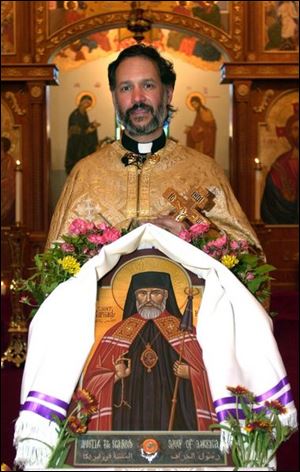
40 days of fasting, increased prayer mark Great Lent
3/12/2005
The Rev. Paul Albert has a painting of St. Raphael at St. Elias Antiochian Orthodox Church in Sylvania.
The Israelites spent 40 years wandering in the desert, Moses fasted on Mount Sinai for 40 days, Elijah abstained from food for 40 days on his journey to Mount Horeb, and Jesus fasted for 40 days and nights in the wilderness when he was tempted by the devil.
Inspired by biblical accounts, Orthodox Christians annual observe 40 days of fasting during Great Lent, which this year will start on Monday, which is also known as Clean Monday.
"It is a time of increased prayer, increased fasting from foods, and also alms-giving and charitable work," said the Rev. Matthew-Peter Butrie, pastor of St. George Orthodox Cathedral, the Rossford parish that belongs to the Orthodox Church in America.
There are four Orthodox churches in the Toledo area - St. George OCA in Rossford, St. George Antiochian Cathedral in Toledo, St. Elias Antiochian in Sylvania, and Holy Trinity Greek Orthodox Cathedral in Toledo.
Some of the more than 1 million Orthodox Christians in the United States follow a strict fast during Great Lent that includes abstaining from meat, fish, eggs, and dairy products, Father Matthew said.
"About the only things that are allowed are vegetables, shellfish, fruits, beans, and grains," he added.
The Rev. Aristotle Damaskos, pastor of Holy Trinity, said the purpose for Great Lent is not just to give up earthly pleasures, but to pursue spiritual goals.
"I use the analogy that it is a time to become more in love with God, to desire to be closer to Him," Father Aristotle said.
Archbishop Demetrios, the New York-based leader of the Greek Orthodox Archdiocese of America, issued a statement on Great Lent calling it "a spiritual treasure, a special opportunity to direct our full attention to the cultivation of the soul through repentance and prayer."
The Rev. Paul Albert, pastor of St. Elias, wrote an essay in the church bulletin saying that some people try to ignore Great Lent because they become frustrated by its rigors.
"Great Lent should never be ignored," Father Paul advised, adding that everyone can meet the primary goal: "Do the best you can."
There are many ways to participate without "a spirit of gloomy self-denial," he wrote, from turning off the television or radio to reading the Scriptures to participating in Lenten services.
At the end of the 40-day period, starting April 22, there is "a festive interlude" between the end of Great Lent and the beginning of Holy Week, Father Matthew said.
April 23 is Lazarus Saturday, he said, the day Orthodox Christians observe how Jesus raised Lazarus from the dead, and on Palm Sunday Jesus' triumphal entry into Jerusalem is celebrated.
Great Lent and Holy Week all lead to Easter, the most sacred and holy day of the Orthodox calendar, which this year will be observed May 1.
While the rest of Christendom observes Easter on March 27, Father Aristotle explained that according to Eastern Orthodox calculations, Easter Sunday must be celebrated on the first Sunday following the full moon of the vernal equinox, and always after the Jewish feast of Passover.